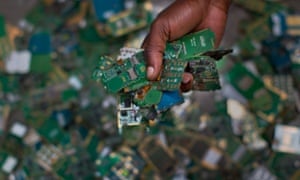Up to 90% of world's electronic waste is illegally dumped, says UN
PCs and smartphones adding to ‘e-waste mountain’ that could reach 50m tonnes by 2017, much of it dumped and traded in developing countries, reports BusinessGreen

Computers and smart phones are among the ditched items contributing to this 41m tonne e-waste mountain, which could top 50m tonnes by 2017, Unep says in a new report launched today in Geneva.
It follows last month’s UN University report, which outlined how 42m tonnes of electronic waste were thrown out in 2014 at a cost of $52bn to the global economy.
Exporting hazardous waste from EU and Organisation for Economic Co-operation and Development (OECD) Member States to non-OECD countries is banned.
However, Unep says thousands of tonnes of e-waste are falsely declared as second-hand goods and exported from developed to developing countries, including waste batteries falsely described as plastic or mixed metal scrap, and cathode ray tubes and computer monitors misleadingly declared as metal scrap.
African and Asian countries such as Ghana, Nigeria, China, Pakistan, India, and Vietnam are turning into illegal e-waste hubs, bypassing the legitimate global waste and recycling market that is thought to be worth $410bn a year.
Unep warns the growing volumes of e-waste, municipal waste, food waste, discarded chemicals and counterfeit pesticides are all having significant environment and economic impacts.
Countries are also losing out on significant amounts of resources, such as rare earth metals, copper and gold, while the conditions in which the products are dumped can be extremely hazardous to health.
Unep wants counties to strengthen national legislation and enforcement of e-waste legislation as well as working to increase the recovery of valuable metals and other resources locked inside electronic products.
“We are facing the onset of an unprecedented tsunami of electronic waste rolling out over the world,” said Achim Steiner, UN Under-Secretary-General and Executive Director of Unep.
“Through enhanced international cooperation and legislative coherence, stronger national regulations and enforcement, as well as greater awareness and robust prevention measures we can ensure that the illegal trade and dumping of e-waste is brought to an end. This will create a win-win situation, whereby rare and expensive elements are safely recycled and reused, boosting the formal economy, depriving criminals of income and reducing health risks to the public.”
0 comments: